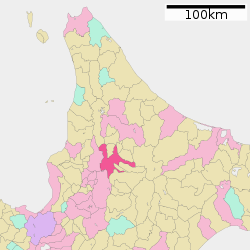Asahikawa
|
Asahikawa 旭川市 |
||
|---|---|---|
| Core city | ||
|
||
 Location of Asahikawa in Kamikawa Subprefecture, Hokkaido |
||
 Location of Kamikawa Subprefecture in Hokkaido |
||
| Location in Japan | ||
| Coordinates: 43°46′N 142°22′E / 43.767°N 142.367°ECoordinates: 43°46′N 142°22′E / 43.767°N 142.367°E | ||
| Country | Japan | |
| Region | Hokkaido | |
| Prefecture | Hokkaido | |
| Government | ||
| • Mayor | Masahito Nishikawa | |
| Area | ||
| • Total | 747.6 km2 (288.6 sq mi) | |
| Population (July 30, 2011) | ||
| • Total | 352,105 | |
| • Density | 470.98/km2 (1,219.8/sq mi) | |
| Symbols | ||
| • Tree | Japanese rowan | |
| • Flower | Azalea | |
| • Bird | Bohemian waxwing | |
| • Others | Insect: Kantan (Oecanthus longicauda) | |
| Time zone | Japan Standard Time (UTC+9) | |
| City hall address | 9-46 Rokujō-dōri, Asahikawa-shi, Hokkaido 070-8525 |
|
| Website | www |
|
Asahikawa (旭川市 Asahikawa-shi?) is a city in Kamikawa Subprefecture, Hokkaido, Japan. It is the capital of the subprefecture and the second-largest city in Hokkaido, after Sapporo. It has been a core city since April 1, 2000. The city is currently well known for the Asahiyama Zoo and Asahikawa ramen.
On July 31, 2011, the city had an estimated population of 352,105, with 173,961 households and a population density of 470.96 persons per km² (1,219.8 persons per sq. mi.). The total area is 747.6 km2 (288.6 sq mi).
The Ainu called the Asahi River Chiu Pet meaning "River of Waves", but it was misunderstood as Chup Pet meaning "Sun River", and so it came to be called Asahi River in Japanese (Asahi meaning "morning sun").
On August 1, 1922, Asahikawa was founded as Asahikawa City. As the central city in northern Hokkaido, Asahikawa has been influential in industry and commerce. There are about 130 rivers and streams including the Ishikari River and Chūbetsu River, and over 740 bridges in the city.Asahibashi, a bridge over Ishikari River, has been one of the symbols of Asahikawa since its completion in 1932, and it was also registered as one of the Hokkaido Heritage sites on October 22, 2001.
Every winter, the Asahikawa Winter Festival is held on the bank of the Ishikari River, making use of Asahikawa's cold climate and snow. On January 25, 1902, a weather station recorded −41 °C (−41.8 °F), the lowest temperature in Japanese history. Due to its climate and location surrounded by mountains, there are some ski resorts in the outskirts of the city.
...
Wikipedia


